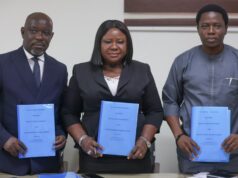WED, JAN 15 2020-theG&BJournal- Included in the list are climate crisis, delivering health in countries with protracted conflict, making healthcare fairer, expanding access to medicines, vaccines, diagnostics tools and other essential health products to about one third of the world’s people lacking access, stopping infectious diseases like HIV, tuberculosis, viral hepatitis, malaria, neglected tropical diseases and sexually transmitted diseases projected to kill 4 million people in 2020, most of them poor.
Identified also are cost of preparing for pandemics, ‘’of a new, highly infectious, airborne virus-most likely a strain of influenza-to which most people lack immunity,’’ protecting people from dangerous products, chronic under investment in the education and employment of health works, keeping adolescents safe.
WHO says it will issue in 2020 new guidance for policymakers, health practitioners and educators called Helping Adolescents Thrive. According to WHO, the aim is to promote adolescents’ mental health and prevent the use of drugs, alcohol, self harm and interpersonal violence, as well as provide young people with information on preventing HIV and other sexually transmitted infections, contraception and care during pregnancy and child birth.
There is also the challenge of public trust in health services. WHO says public health is compromised by the uncontrolled dissemination of misinformation in social media, as well as through an erosion of trust in public institutions. It noted that the ant-vaccination movement has been a significant factor in the rise of deaths in preventable diseases.
Another global challenge identified by WHO are new technologies which it says throws up the challenges for monitoring and regulations.
‘’Without a deeper understanding of their ethical and social implications, these new technologies, which include the capacity to create new organisms, could harm the people they intend to help,’’ WHO said.
In 2019 WHO set up new advisory committees for human genome editing and digital health, bringing the world’s leading experts to review evidence and provide guidance.
Anti-microbial resistance (AMR) threatens to send modern medicines back decades to pre-antibiotic era, when even routine surgeries were hazardous. According to WHO, The rise of AMR stems from myriad factors that have come together to create a terrifying brew, including unregulated prescription and use of antibiotics, lack of access to quality and affordable medicines, and lack of clean water, sanitation, hygiene and infection prevention and control.
Keeping health care clean is another identified challenge. WHO says roughly one in four health facilities globally lack basic water services. Water, sanitation and hygiene (WASH) are critical to a functioning health system.
‘’The lack of these basics in health facilities leads to poor quality care and an increased chance of infection for patients and health workers.’ All of these are happening against a backdrop of billions of people around the world living in communities without safe water to drink or adequate sanitation services-both of which are major drivers of disease.
‘’All the challenges in this list demand a response from more than just the health sector. We face shared threats and we have a shared responsibility to act. With the deadline for the 2030 Sustainable Development Goals quickly approaching, the United Nations General Assembly has underscored that the next 10 years must be the “decade of action,” says Dr Tedros Adhanom Ghebreyesus, WHO Director-General.
‘’This means advocating for national funding to address gaps in health systems and health infrastructure, as well as providing support to the most vulnerable countries. Investing now will save lives – and money – later.’’
According to the WHO Director-General, the cost of doing nothing is one we cannot afford. Governments, communities, and international agencies must work together to achieve these critical goals.
‘’There are no shortcuts to a healthier world. 2030 is fast approaching, and we must hold our leaders accountable for their commitments.’’
twitter:@theGBJournal|email: info@govandbusinessjournal.com.ng|
Subscribe
Login
0 Comments
Oldest









